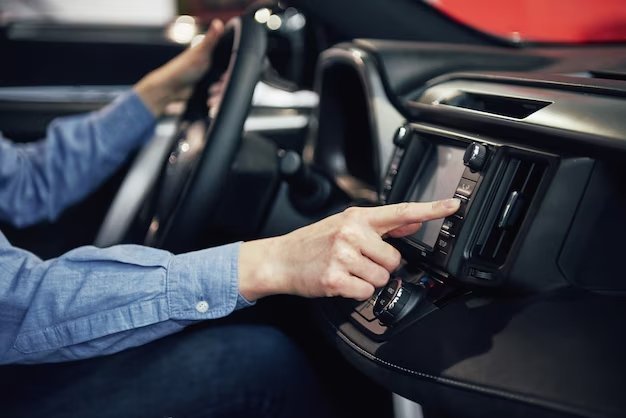Steering Control Unit: Everything You Need to Know for Smooth Driving in the USA
Learn all about the Steering Control Unit, its functions, common issues, and maintenance tips for safe driving in the USA. Discover signs of SCU failure and replacement costs.

Modern vehicles rely on complex systems to ensure safe and efficient operation. One of the critical components in this technological evolution is the Steering Control Unit (SCU). This essential part plays a vital role in managing and enhancing your car's steering capabilities, contributing to overall driving safety and comfort. Whether you are an experienced driver or a car enthusiast, understanding the steering control unit's function can help you identify potential issues early and maintain your vehicle's performance. This guide will delve into what a steering control unit is, its functions, common problems, and how to maintain it effectively.
What is a Steering Control Unit?
The Steering Control Unit (SCU) is an electronic component responsible for managing the vehicle's steering system. It processes data from various sensors, ensuring precise control over the steering mechanism. In modern cars, especially those equipped with electric power steering (EPS) or advanced driver-assistance systems (ADAS), the SCU plays a crucial role in adjusting steering angles, maintaining stability, and providing feedback to the driver.
Functions of a Steering Control Unit
The SCU performs multiple functions to enhance vehicle performance and safety:
- Data Processing: The unit collects information from sensors, such as steering angle sensors, speed sensors, and torque sensors, to determine the appropriate steering response.
- Steering Assistance: In vehicles with electric power steering, the SCU adjusts the level of assistance based on driving conditions, making steering easier at low speeds and firmer at high speeds.
- Stability Control: The SCU works with other systems like the Electronic Stability Control (ESC) and Anti-lock Braking System (ABS) to maintain vehicle stability, especially during sharp turns or slippery conditions.
- Adaptive Features: In cars with ADAS, the SCU enables features like lane-keeping assist, automatic parking, and collision avoidance by precisely controlling the steering input.
Common Signs of a Faulty Steering Control Unit
Recognizing the signs of a malfunctioning SCU can prevent potential hazards. Here are common symptoms to watch for:
- Warning Lights: The most obvious sign is the illumination of the steering warning light or other dashboard indicators related to the steering system.
- Unresponsive Steering: If the steering feels stiff or unresponsive, it could indicate issues with the SCU.
- Erratic Steering Behavior: Sudden changes in steering behavior, such as pulling to one side or inconsistent steering assistance, may point to a faulty control unit.
- Noise While Steering: Unusual noises, like clicking or grinding when turning the wheel, could be linked to SCU problems.
Causes of Steering Control Unit Failures
Several factors can contribute to SCU failures:
- Electrical Issues: Faulty wiring, blown fuses, or poor connections can disrupt the SCU's function.
- Sensor Malfunctions: If sensors providing data to the SCU are damaged or faulty, the unit may receive incorrect information.
- Software Glitches: Modern SCUs rely on software updates. Outdated or corrupted software can lead to malfunctions.
- Physical Damage: Accidents or exposure to moisture and extreme temperatures can damage the SCU.
How to Diagnose Steering Control Unit Problems
Diagnosing SCU issues requires a systematic approach:
- Check for Error Codes: Use an OBD-II scanner to retrieve error codes related to the steering system.
- Inspect Wiring and Connections: Visually inspect the wiring harness, connectors, and fuses associated with the SCU.
- Test Sensors: Verify the functionality of sensors connected to the steering system.
- Professional Diagnosis: If you're unable to pinpoint the issue, consult a professional mechanic for a thorough inspection.
Maintaining Your Steering Control Unit
Proper maintenance can extend the lifespan of your SCU and ensure optimal performance:
- Regular Inspections: Periodically check the steering components and electronic systems for signs of wear or damage.
- Software Updates: Ensure your vehicle's software is up-to-date, especially if your car features advanced driver-assistance technologies.
- Protect from Moisture: Avoid exposing the SCU to moisture and extreme conditions by ensuring proper sealing and protection.
- Address Issues Promptly: If you notice any warning signs, address them immediately to prevent further damage.
When to Replace a Steering Control Unit
While some SCU issues can be repaired, there are instances when replacement is the best option:
- Persistent Malfunctions: If repeated repairs fail to resolve the problem, replacing the SCU might be necessary.
- Severe Physical Damage: In cases of significant physical damage due to accidents or corrosion, replacement is often the only solution.
- Manufacturer Recommendations: Follow the vehicle manufacturer's guidelines regarding SCU replacement intervals.
Cost of Steering Control Unit Replacement in the USA
The cost of replacing a steering control unit varies based on the vehicle make and model, but here are some general estimates:
- Parts Cost: The SCU itself can range from $300 to $1,000 depending on the complexity and brand of the vehicle.
- Labor Costs: Professional installation may add $100 to $500, depending on the labor rates in your area.
- Total Cost: On average, expect to pay between $400 and $1,500 for SCU replacement in the USA.
Conclusion
The Steering Control Unit is a vital component in modern vehicles, ensuring precise control, enhanced safety, and improved driving comfort. Understanding its functions, recognizing the signs of failure, and knowing how to maintain it can help keep your car in optimal condition. Regular inspections, timely repairs, and staying updated on software can prevent costly issues and enhance your driving experience. If you suspect problems with your SCU, consult a professional to ensure safe and smooth driving.
What's Your Reaction?

















